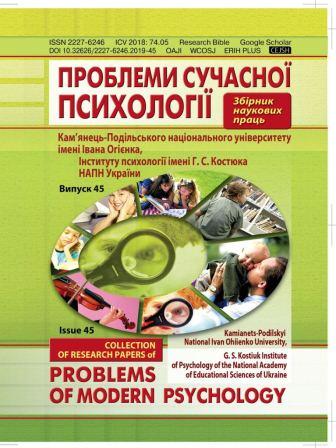Features of Categorization in the Field of Subject Perception of Adult Active Internet Users
DOI:
https://doi.org/10.32626/2227-6246.2019-45.261-279Keywords:
categorization, cognitive complexity, sign system, printed word, media image, semantic di0exFB00rential, factor analysis.Abstract
The article is devoted to categorization as one of the leading mechanisms of
cognitive activity. Theoretical positions in the understanding of categorization
are considered, the appeal to the methodology of the psychosemantic ap-
proach in its empirical study is substantiated. A hypothesis about the compli-
cation of the categorical structure of consciousness of adult users of digital
technologies due to speci0xFB01c characteristics of the Internet is expressed. The
results of the study of the cognitive complexity of consciousness in the 0xFB01eld of
subjectsensory cognition of adult active Internet users are presented. It has
been empirically proven that they have no cognitive advantages as compared
with adults who continue to use the printed word as the preferred information
coding system (on a sample of 500 people over 35 years old who are know
ledge workers). An explanation is o0exFB00red to the recorded absence of di0exFB00
rences in categorization through the commonality among respondents of the
culturalhistorical nature of the knowledge categories of the objective world
and through the features of the media image as the leading coding unit of
Internet information.
References
Artemjeva, E. Ju. (1980). Psihologija subjektivnoj semantiki [Psychology of subjective semantics]. Moskva : MGU [in Russian].
Bruner, Dzh. (1977). Psihologija poznanija [Psychology of knowledge]. Moskva : Progress [in Russian].
Lakoff, Dzh. (2004). Zhenshchiny, ogon’ i opasnye veshchi: Chto kategorii jazyka goworjat nam o myshlenii [Women, fire and dangerous things: what categories of language tell us about thinking]. Moskva : Jazyki slavjanskoj kul’tury [in Russian].
Lurija, A. R. (1982). Kul’turnye razlichija i intellektual’naja dejatel’nost’ [Cultural differences and intellectual activity]. E. D. Khomskaia (Ed.). Jetapy projdennogo puti – Stages of travelled distance. Moskva : MGU [in Russian].
O’Reili, T. (2018). Chto takoe Veb 2.0? [What is Web 2.0?]. Retrieved from http://www.computerra.ru/think/234100/ [in Russian].
Petrenko, V. F. (2005). Osnovy psihosemantiki [Basics of psychosemantics]. Sankt-Peterburg : Piter [in Russian].
Petrovskij, A. V., & Jaroshevskij, M. G. (Eds.). (1990). Psihologija: slovar’ [Psychology: dictionary]. Moskva : Politizdat [in Russian].
Shmelev, A. G. (1982). Ob ustojchivosti faktornoj struktury lichnostnogo semanticheskogo differentsiala [On the stability of the factor structure of the personal semantic differential]. Vestnik MGU – Bulletin of Moscow State University. Series 14. Psychology, 2, 62–65 [in Russian].
Bentler, P. M., & Lavoie, A. L. (1972). An Extension of semantic Space. Journal of Verbal Learning and Verbal Behaviour, 109, 123–144.
Cohen, H., & Lefebre, C. (2005). Bridging the category divide. Handbook of categorization in cognitive science. Montreal : Elselvier.
Harnad, S., Cohen, H., & Lefebre, C. (2005). To cognize is to categorize: cognition is categorization. Handbook of categorization in cognitive science. Montreal : Elsevier.
Harnad, S. (1990). Psychophysical and cognitive aspects of categorical perception: a critical overview. Categorical perception: the groundwork of cognition. New York : Cambridge University Press.
Kirby, A. (2009). Digimodernism: How New Technologies Dismantle the Postmodern and Reconfigure Our Culture. New York : Continuum Publishing Corporation.
Mervis, C. B., & Rosch, E. (1981). Categorization of natural objects. Annual Review of Psychology, 32, 89–115.
Osgood, C. E., Suci, G., & Tannenbaum, P. (1957). The measurement of meaning. Chicago & London : University of Illinois Press.
Osgood, C. E. (1962). Studies on generality of affective meaning system. Amer. Psychologist, 17, 10–28.
Downloads
Published
How to Cite
Issue
Section
License
Copyright
The Editorial Board has the full right to publish original scientific papers containing results of theoretical and experimental research works which are not currently subject to review for publication in other scientific editions. The Author shall transfer to the editorial board of the Collection the right to spread the electronic version of the paper, as well as the electronic version of the paper translated into English (for papers originally submitted in Ukrainian and Russian) by all kinds of electronic means (placement at the official website of the Collection, electronic databases, repositories etc).
The Author of an article reserves the right to use materials of the paper, without approval with the editorial board and the founders of this Collection: a) partially or fully, for educational purposes; b) for writing own dissertation papers; c) for preparation of abstracts, conference reports and presentations.
The Author of an article can place electronic copies of the paper (including the final electronic version downloaded from the official website of the Collection) at:
- personal web resources of all Authors (websites, webpages, blogs etc.);
- web resources of the institutions where the Authors are employed (including electronic institutional repositories);
- non-profit public access web resources (for example, arXiv.org).
But in all cases, it is obligatory to have a bibliographic reference to the paper, or a hyperlink to its electronic copy placed at the official website of this Collection.






